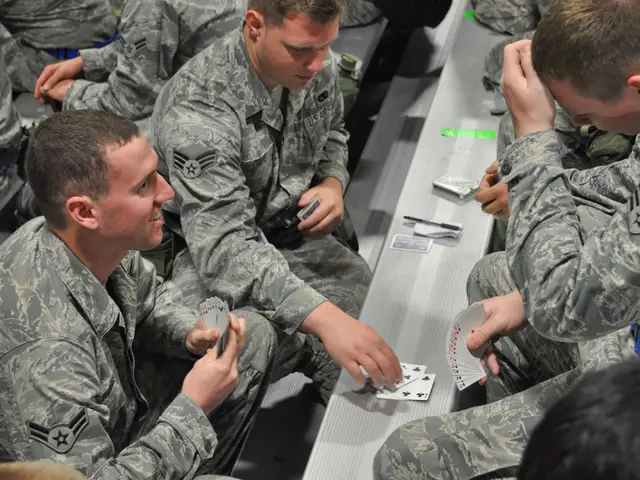Gambling Unveiled: Evolution from Unintentional Obsession to Devil's Pursuit (Reference to Roulette)
Rockin' the Roulette: Hidden Tales of a Casino Classic
Let's dive into the less-told tales of roulette, one of casino's most popular games that's dripping with intrigue. Ever wondered how this wheel of destiny came to life, or why it's sometimes called the 'Devil's Game'? Read on to learn some surprising secrets!
Spinning the Origin Story
Roulette's tale begins with an accidental whirlwind. French mathematician Blaise Pascal wasn't trying to design a casino game in 1655, but a perpetual motion machine. His endeavor inadvertently led to the creation of the roulette wheel, a game that would captivate millions worldwide.
Fast-forward to today, and roulette remains one of the most recognized games in the gambling sphere—a testament to how unplanned discoveries can spark significant innovations.
The Devil in the Details: Numerology and Roulette
Rumors swirl around roulette and the number 666, dubbing it the 'Devil's Game.' While no supernatural forces are at play, mathematics offers a sneaky explanation. The total sum of numbers on a standard roulette wheel (omitting 0) equals 666.
Despite appearing eerie, this number coincidence adds extra shades of mystery to roulette's allure.
Global Roulette Rumble: How it Evolved
Roulette has made its mark in various corners of the globe, spawning various iterations due to cultural and regulatory differences:
- American Roulette: Boasts two zero pockets, hiking the house edge.
- European Roulette: Proudly flaunts a single zero, offering players friendlier odds.
- French Roulette: Mirrors European roulette, but includes special rules that sometimes tilt the scale in the player's favor.
Each version presents unique betting strategies and odds—details that level up the gambling experience.
Wheel of Fortune's Longest Streak
In 1943, an unprecedented event unfolded at a casino in San Remo, Italy. The roulette ball rolled black 32 times in a row—a jaw-dropping 1-in-4,294,967,296 likelihood! This extraordinary string of events illustrates roulette's unpredictable nature and its ability to enrapture players.
The James Bond Strategy
The suave spy James Bond lends his name to a daring roulette betting strategy. It involves covering a considerable portion of the roulette table by placing:
- £14 on 19-36
- £5 on 13-18
- £1 on 0
While this ambitious setup doesn't guarantee long-term winnings, it offers an intriguing approach to betting.
Roulette's Alias Collection
Roulette has picked up assorted nicknames throughout history:
- 'The Devil's Game': Due to the 666 sum of numbers, hinting at the supernatural.
- 'The King of Casino Games': A nod to its high-profile status.
- 'Little Wheel': A simple translation of 'Roulette' from French.
These alias collections highlight roulette's cultural impact and lasting appeal.
The Science Behind the Spin: Physics and Roulette
Though roulette is a game of chance, the quest to use physics for an edge keeps blossoming. In the 1970s, a group known as the Eudaemons attempted to use wearable computers to predict roulette outcomes, achieving limited success before casinos put a stop to such tactics.
This cat-and-mouse game epitomizes the ongoing struggle between the casino world and those studying to beat the system, along with technology's evolving role in gaming.
Roulette and Pop Culture
Through films and literature, roulette has made countless appearances, often embodying risk, mystery, and elegance. From James Bond films to Dostoyevsky's 'The Gambler,' roulette has cemented itself as a cultural shorthand for high-stakes gambling and the thrill of uncertainty.
The House Edge Unveiled
Understanding the house edge is crucial for every roulette player:
- American Roulette: Offers an unfavorable 5.26% house edge.
- European Roulette: Reduces the house edge to a more manageable 2.7%.
- French Roulette: Can drop the house edge to as low as 1.35% thanks to certain rules.
These figures underline why many players gravitate toward European or French roulette.
A Dash of Etiquette
Like all casino games, roulette has its own set of unspoken rules for a smooth experience:
- Refrain from touching your chips after the dealer calls 'no more bets'.
- Wait until the dealer removes the marker before placing new bets.
- Show respect to fellow players and the dealer.
By adhering to these standard norms, gamers can ensure a delightful atmosphere at the table.
The Future Ain't What it Used to Be: The Evolving Face of Roulette
As technology advances, roulette adapts to accommodate new formats: online and live dealer versions are now more accessible than ever. Some casinos are even venturing into virtual reality roulette, bringing the game's charm right into your living room.
This kind of innovation guarantees that roulette continues to thrive while retaining its core characteristics—luck, drama, and suspense rolled into a single spin. In the end, roulette is more than just a gambling game; it's an enchanting journey that keeps players guessing and dreaming. So grab a chips, take a seat, and hold your breath as the roulette wheel twirls unpredictably—who knows where fate will take you next?
- The casino personality, Blaise Pascal, is renowned for inadvertently creating the casino-game Roulette, a classic that has become a casino-culture staple and captivated millions across the globe.
- As gambling-trends evolve, Roulette variations including American Roulette, European Roulette, and French Roulette offer bettors unique probabilities and betting strategies, each contributing to the game's captivating allure.
- Responsible-gambling is integral in the casino-and-gambling sphere, and adhering to etiquettes such as not touching chips after 'no more bets' or waiting for the dealer to clear previous wagers help establish a conducive and enjoyable casino-games environment.





